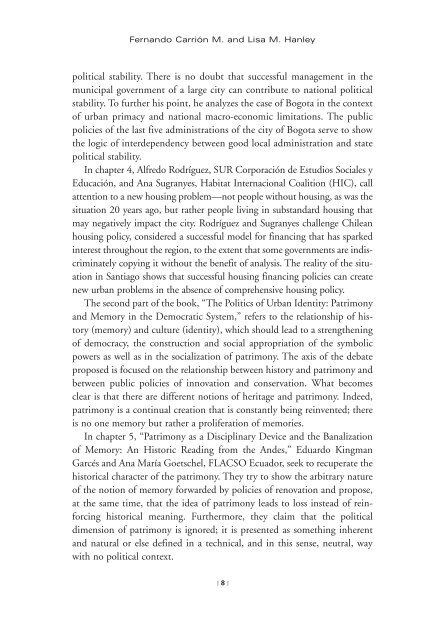urban regeneration and revitalization in the americas - Woodrow ...
urban regeneration and revitalization in the americas - Woodrow ...
urban regeneration and revitalization in the americas - Woodrow ...
You also want an ePaper? Increase the reach of your titles
YUMPU automatically turns print PDFs into web optimized ePapers that Google loves.
Fern<strong>and</strong>o Carrión M. <strong>and</strong> Lisa M. Hanley<br />
political stability. There is no doubt that successful management <strong>in</strong> <strong>the</strong><br />
municipal government of a large city can contribute to national political<br />
stability. To fur<strong>the</strong>r his po<strong>in</strong>t, he analyzes <strong>the</strong> case of Bogota <strong>in</strong> <strong>the</strong> context<br />
of <strong>urban</strong> primacy <strong>and</strong> national macro-economic limitations. The public<br />
policies of <strong>the</strong> last five adm<strong>in</strong>istrations of <strong>the</strong> city of Bogota serve to show<br />
<strong>the</strong> logic of <strong>in</strong>terdependency between good local adm<strong>in</strong>istration <strong>and</strong> state<br />
political stability.<br />
In chapter 4, Alfredo Rodríguez, SUR Corporación de Estudios Sociales y<br />
Educación, <strong>and</strong> Ana Sugranyes, Habitat Internacional Coalition (HIC), call<br />
attention to a new hous<strong>in</strong>g problem—not people without hous<strong>in</strong>g, as was <strong>the</strong><br />
situation 20 years ago, but ra<strong>the</strong>r people liv<strong>in</strong>g <strong>in</strong> subst<strong>and</strong>ard hous<strong>in</strong>g that<br />
may negatively impact <strong>the</strong> city. Rodríguez <strong>and</strong> Sugranyes challenge Chilean<br />
hous<strong>in</strong>g policy, considered a successful model for f<strong>in</strong>anc<strong>in</strong>g that has sparked<br />
<strong>in</strong>terest throughout <strong>the</strong> region, to <strong>the</strong> extent that some governments are <strong>in</strong>discrim<strong>in</strong>ately<br />
copy<strong>in</strong>g it without <strong>the</strong> benefit of analysis. The reality of <strong>the</strong> situation<br />
<strong>in</strong> Santiago shows that successful hous<strong>in</strong>g f<strong>in</strong>anc<strong>in</strong>g policies can create<br />
new <strong>urban</strong> problems <strong>in</strong> <strong>the</strong> absence of comprehensive hous<strong>in</strong>g policy.<br />
The second part of <strong>the</strong> book, “The Politics of Urban Identity: Patrimony<br />
<strong>and</strong> Memory <strong>in</strong> <strong>the</strong> Democratic System,” refers to <strong>the</strong> relationship of history<br />
(memory) <strong>and</strong> culture (identity), which should lead to a streng<strong>the</strong>n<strong>in</strong>g<br />
of democracy, <strong>the</strong> construction <strong>and</strong> social appropriation of <strong>the</strong> symbolic<br />
powers as well as <strong>in</strong> <strong>the</strong> socialization of patrimony. The axis of <strong>the</strong> debate<br />
proposed is focused on <strong>the</strong> relationship between history <strong>and</strong> patrimony <strong>and</strong><br />
between public policies of <strong>in</strong>novation <strong>and</strong> conservation. What becomes<br />
clear is that <strong>the</strong>re are different notions of heritage <strong>and</strong> patrimony. Indeed,<br />
patrimony is a cont<strong>in</strong>ual creation that is constantly be<strong>in</strong>g re<strong>in</strong>vented; <strong>the</strong>re<br />
is no one memory but ra<strong>the</strong>r a proliferation of memories.<br />
In chapter 5, “Patrimony as a Discipl<strong>in</strong>ary Device <strong>and</strong> <strong>the</strong> Banalization<br />
of Memory: An Historic Read<strong>in</strong>g from <strong>the</strong> Andes,” Eduardo K<strong>in</strong>gman<br />
Garcés <strong>and</strong> Ana María Goetschel, FLACSO Ecuador, seek to recuperate <strong>the</strong><br />
historical character of <strong>the</strong> patrimony. They try to show <strong>the</strong> arbitrary nature<br />
of <strong>the</strong> notion of memory forwarded by policies of renovation <strong>and</strong> propose,<br />
at <strong>the</strong> same time, that <strong>the</strong> idea of patrimony leads to loss <strong>in</strong>stead of re<strong>in</strong>forc<strong>in</strong>g<br />
historical mean<strong>in</strong>g. Fur<strong>the</strong>rmore, <strong>the</strong>y claim that <strong>the</strong> political<br />
dimension of patrimony is ignored; it is presented as someth<strong>in</strong>g <strong>in</strong>herent<br />
<strong>and</strong> natural or else def<strong>in</strong>ed <strong>in</strong> a technical, <strong>and</strong> <strong>in</strong> this sense, neutral, way<br />
with no political context.<br />
| 8 |

















